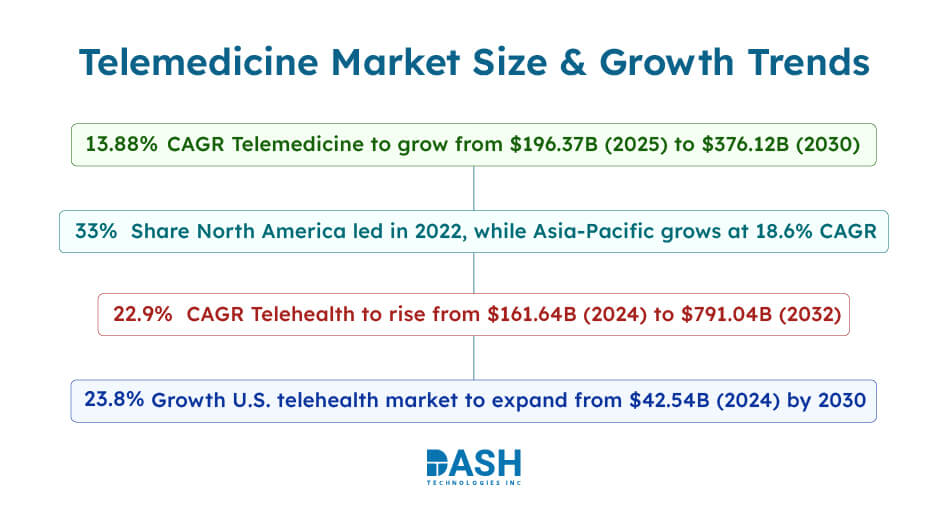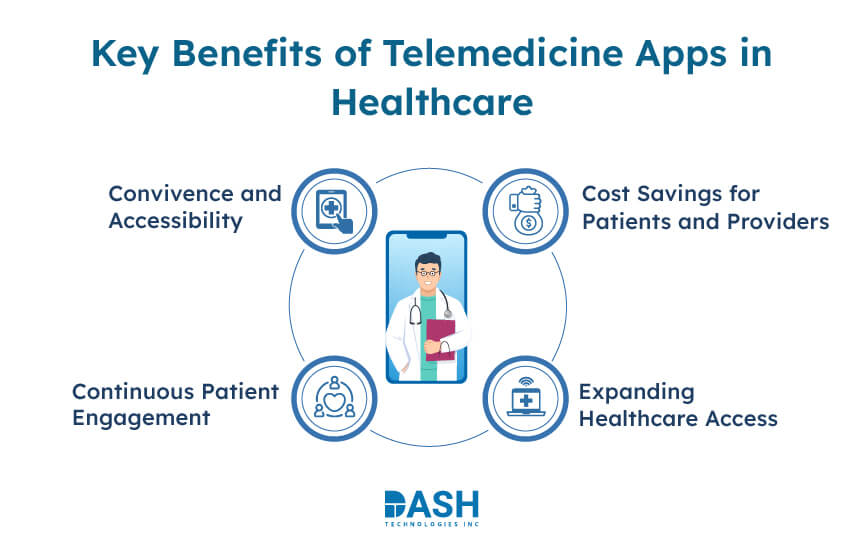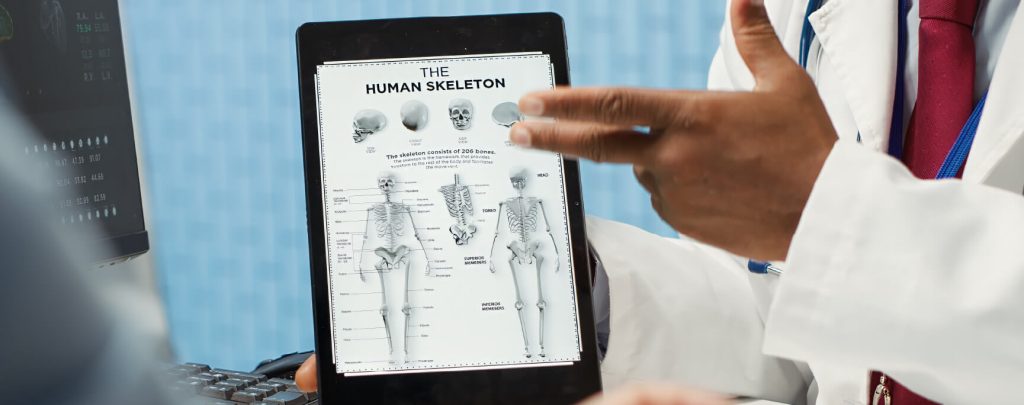How Telemedicine App Development is Revolutionizing Virtual Care?
Telemedicine app development builds software for remote doctor consultations and patient check-ups. These apps bridge healthcare professionals with patients via video calls, secure messages, and interactive interfaces. That helps practitioners to provide care without immediate face-to-face interactions; hence, simplifying access to medical care. Telemedicine applications also manage appointment scheduling, e-prescribing, and sending reminders.
Telemedicine apps do not only conduct remote consultations. They also integrate with entire healthcare platforms, such as patient forums, insurance claims processing, and providing medical information libraries. Remote patient monitoring enables providers to keep track of patients’ vital signs. This helps them intervene and provide care whenever necessary. Telehealth app development eliminates geographical boundaries and facilitates easier communication.
In this blog, we will explore its market growth, essential features, and benefits for both patients and providers.
Telemedicine Market Growth: Key Trends and Future Projections

The telemedicine market is expanding rapidly, driven by increased use of digital services and increased demand for access to treatment remotely. North America is currently the leading region in the market, while Asia-Pacific has the potential for strong growth.
- Mordor Intelligence reports that the global telemedicine market is expected to grow from $196.37 billion in 2025 to $376.12 billion by 2030, at a CAGR of 13.88%.
- Acumen Research & Consulting states that North America held 33% of the telemedicine market share in 2022, while Asia-Pacific is projected to grow at a CAGR of 18.6% from 2023 to 2032.
- Fortune Business Insights states that the global telehealth market was valued at $161.64 billion in 2024 and is projected to reach $791.04 billion by 2032, exhibiting a CAGR of 22.9%.
- Grand View Research reports that the U.S. telehealth market was valued at $42.54 billion in 2024 and is expected to grow at a CAGR of 23.8% from 2025 to 2030, driven by rising demand for remote healthcare services.
Types of Telemedicine: Enhancing Remote Healthcare Through Technology
There are three types of telemedicine. When used effectively, all of these have a beneficial role in general health care and can significantly benefit both healthcare professionals and patients. Let’s discuss that in detail:
- Store & Forward Telemedicine
Store & forward telemedicine, or asynchronous telehealth where patient information is made available to health practitioners securely without the need for real-time communication. The information comprises medical images, lab results, and reports.
Secure transmission sends patient data to medical professionals while keeping it confidential. This process is often used across dermatology, pathology, and radiology. And they examine stored medical information to make diagnoses. This reduces waiting times. - Telemedicine Remote Monitoring
Remote patient monitoring allows healthcare workers to check patients’ health without personal visits. Sensors and devices track vital signs and detect problems. They send alerts for quick medical help. This technology helps manage chronic illnesses, such as diabetes and heart disease. It does this by spotting early warning signs.
For example, fitness trackers and smartwatches monitor heart rate, and oxygenation. This keeps the user and physician aware of health and problems in an early state. Telemedicine solution providers use IoT, and remote monitoring devices to enhance proactive care, reduce hospitalizations, and improve long-term disease management. - Real-Time Telemedicine
Real-time telemedicine allows health professionals and patients to consult through live video and audio calls. It works well for routine check-ups, urgent care, and mental health support. Tools like Zoom for Healthcare provide secure virtual consultations.
EHR systems and e-prescription software help providers access records and prescribe medication online. A healthcare app development company develops secure, easy-to-use telemedicine platforms for real-time use.
Telemedicine App Development: Key Features You Need to Know
Effective data access is critical for accurate diagnosis and treatment decisions. Integrate EHR systems to enable smooth information sharing among healthcare providers. Let’s explore how digital healthcare solutions support these advancements:
- Automated Appointment Scheduling
A smart scheduling system matches provider schedules to patient needs, reducing administrative work and integrated calendar APIs ensure real-time syncing. AI-driven scheduling suggests the best time slots and automated reminders via SMS, email and in-app notifications. - Secure Patient-Provider Messaging
End-to-end encryption messaging provides secure communication between healthcare professionals and patients. Secure messaging platforms are AES-256 encrypted and HIPAA compliant. Natural Language Processing (NLP) chatbots handle common questions, reduce response time for typical patient concerns, audit logs, access controls add security and compliance.
Empower Healthcare with Telemedicine Innovation
Develop a cutting-edge telemedicine app to enhance patient access, streamline workflows, and improve care delivery
Talk to Our Experts- E-Prescriptions and Pharmacy Integration
E-prescription systems establish a direct connection with pharmacies enabling providers to send prescriptions through electronic means. Digital signatures and multi-factor authentication ensure prescription authenticity. Connecting with pharmacy management systems provides real-time stock levels, preventing medication shortages. AI-driven drug interaction alerts physicians of possible contraindications. - Electronic Health Records Access
EHR integration lets providers see patient medical histories right away and improves diagnostic accuracy. HL7 and FHIR protocols help telemedicine apps work well with hospital systems.
Technologies Used in Telehealth App Development
- Artificial Intelligence
AI in telemedicine app development services boost efficiency by automating manual and routine tasks. AI chatbots help in scheduling, responding to patient inquiries, and organizing doctors’ calendars. Moreover, voice recognition and language processing help improve communication between patients and providers. Such AI-based features assist in streamlining operations. - Big Data
Big data in telemedicine assists with the processing of high volumes of patient data. It helps clinicians make decisions. They can analyze medical history, recognize patterns, and spot trends. Telemedicine sites can improve diagnosis and treatment. They do this by organizing and assessing both ordered and unordered information.
Big data also assists remote monitoring through time-series tracking of patient health values. Providers can identify changes in time to adjust treatment plans as needed. Furthermore, healthcare organizations leverage big data to maximize resource allocation, enhancing service efficiency. - Blockchain
Blockchain keeps patient information safe in decentralized records and prevents unauthorized access. It provides privacy and maintains data integrity of medical records on telemedicine platforms. As a result, providers and patients can use authenticated health data without fear of tampering. Blockchain facilitates secure digital prescriptions and payments. A healthcare app development company can use blockchain for better security in telemedicine.
Top Benefits of Telemedicine Apps for Modern Healthcare

- Convivence and Accessibility
Telemedicine apps allow patients to visit providers virtually, reducing face-to-face interaction. Virtual consults provide expanded medical access for individuals with mobility or busy lifestyles. Secure video calls and messaging ensure timely healthcare delivery. The method increases medical support, particularly in underserved communities. - Cost Savings for Patients and Providers
Remote healthcare cuts travel costs for patients and reduces hospital visits. It also lowers operational costs for providers. Online scheduling and follow-up also make medical services more convenient. - Continuous Patient Engagement
A telemedicine solution promotes continuous patient participation through remote monitoring and interaction in real time. Automated reminders, health tips, and medication alerts are sent to support the patients regarding their treatment plans. - Expanding Healthcare Access
Telehealth applications enhance the ability of providers to operate in rural and remote areas enabling cross-border consultations and provide better access to specialty care. Ultimately, it enables healthcare providers to consult a large number of patients with less effort using virtual methods. Telehealth app development services are improving access to healthcare and enable timely interventions.
Why Dash Technologies for Telemedicine App Development?
Telemedicine app development needs safe, scalable, and compliant platforms for remote healthcare. At DASH, we build secure, scalable, and compliant telemedicine platforms tailored to your healthcare needs. Our telemedicine app development services include AI, IoMT, and data analytics to improve patient care and simplify operations.
We make sure our solutions integrate smoothly with existing healthcare systems to support better workflows. We also follow strict regulatory standards to keep patient data safe. Our goal is to help healthcare providers deliver reliable and accessible virtual care. Ready to develop your telemedicine app? Contact us today to get started.
About Dash

Dash Technologies Inc.
We’re technology experts with a passion for bringing concepts to life. By leveraging a unique, consultative process and an agile development approach, we translate business challenges into technology solutions Get in touch.







